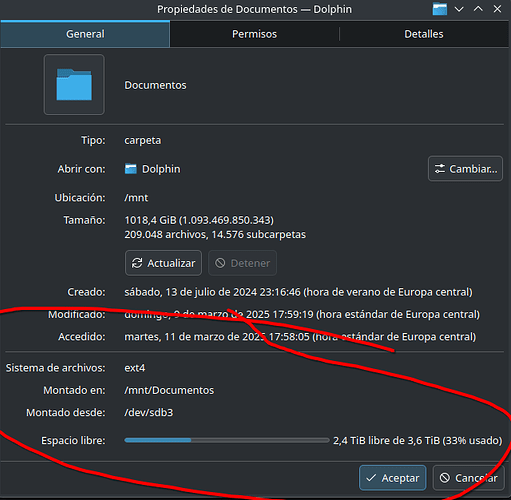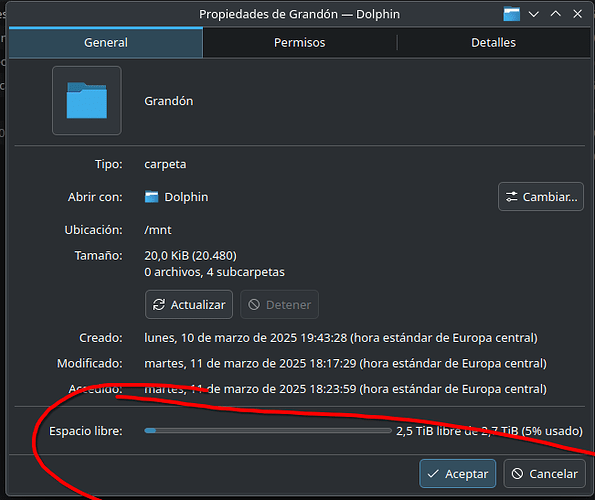Hello. I am having a weird issue with trash bin:
I have a gib file (for testing) called Age.sh in a disk (/dev/sda) mounted in /run/media/Grandón/Descargas.
If I do gio trash Age.sh it works inmediately and it appears in the disk .Trash-1000/files folder. Besides, if I go to dolphin and press “del” (which is set to “move to trash bin”) it takes several minutes and it moves to main disk trash bin (~/.local/share/Trash/files) folder.
In dolphin, preferences, trash bin, the folder exists (/run/media/Grandón); besides, move to trash bin always send it to my other disk.
It only happens with this disk folder; my other disks doesn’t have these problems.
My info:
╰─λ garuda-inxi
System:
Kernel: 6.13.5-zen1-1-zen arch: x86_64 bits: 64 compiler: gcc v: 14.2.1
clocksource: tsc avail: hpet,acpi_pm
parameters: BOOT_IMAGE=/vmlinuz-linux-zen
root=UUID=fa13788d-7bd4-4c6f-a84c-5a183071b3fb rw rootflags=subvol=@
quiet loglevel=3 splash video=DP-1:2560x1440@165 ibt=off
Desktop: KDE Plasma v: 6.3.2 tk: Qt v: N/A info: frameworks v: 6.11.0
wm: kwin_wayland vt: 1 dm: SDDM Distro: Garuda base: Arch Linux
Machine:
Type: Desktop System: Micro-Star product: MS-7C37 v: 2.0
serial: <superuser required>
Mobo: Micro-Star model: MPG X570 GAMING PLUS (MS-7C37) v: 2.0
serial: <superuser required> uuid: <superuser required> UEFI: American
Megatrends LLC. v: A.P1 date: 08/30/2024
Battery:
Device-1: hidpp_battery_0 model: Logitech Wireless Mouse MX Master 3
serial: <filter> charge: 100% (should be ignored) rechargeable: yes
status: discharging
Device-2: hidpp_battery_1 model: Logitech MX Keys Wireless Keyboard
serial: <filter> charge: 50% (should be ignored) rechargeable: yes
status: discharging
CPU:
Info: model: AMD Ryzen 5 5600X bits: 64 type: MT MCP arch: Zen 3+ gen: 3
level: v3 note: check built: 2022 process: TSMC n6 (7nm) family: 0x19 (25)
model-id: 0x21 (33) stepping: 2 microcode: 0xA201210
Topology: cpus: 1x dies: 1 clusters: 1 cores: 6 threads: 12 tpc: 2
smt: enabled cache: L1: 384 KiB desc: d-6x32 KiB; i-6x32 KiB L2: 3 MiB
desc: 6x512 KiB L3: 32 MiB desc: 1x32 MiB
Speed (MHz): avg: 3719 min/max: 550/4651 boost: enabled scaling:
driver: amd-pstate-epp governor: performance cores: 1: 3719 2: 3719 3: 3719
4: 3719 5: 3719 6: 3719 7: 3719 8: 3719 9: 3719 10: 3719 11: 3719 12: 3719
bogomips: 88798
Flags: avx avx2 ht lm nx pae sse sse2 sse3 sse4_1 sse4_2 sse4a ssse3 svm
Vulnerabilities: <filter>
Graphics:
Device-1: Advanced Micro Devices [AMD/ATI] Navi 22 [Radeon RX 6700/6700
XT/6750 XT / 6800M/6850M XT] vendor: Tul / PowerColor driver: amdgpu
v: kernel arch: RDNA-2 code: Navi-2x process: TSMC n7 (7nm) built: 2020-22
pcie: gen: 4 speed: 16 GT/s lanes: 16 ports: active: DP-1,DP-2
empty: DP-3,HDMI-A-1,Writeback-1 bus-ID: 2f:00.0 chip-ID: 1002:73df
class-ID: 0300
Display: wayland server: X.org v: 1.21.1.16 with: Xwayland v: 24.1.6
compositor: kwin_wayland driver: X: loaded: amdgpu
unloaded: modesetting,radeon alternate: fbdev,vesa dri: radeonsi
gpu: amdgpu d-rect: 5120x1440 display-ID: 0
Monitor-1: DP-1 pos: right model: VG27AQA1A serial: <filter> built: 2023
res: mode: 2560x1440 hz: 165 scale: 100% (1) dpi: 109 gamma: 1.2
size: 597x336mm (23.5x13.23") diag: 685mm (27") ratio: 16:9 modes:
max: 2560x1440 min: 720x400
Monitor-2: DP-2 pos: primary,left model: Philips 27M2N5500
serial: <filter> built: 2024 res: mode: 2560x1440 hz: 165 scale: 100% (1)
dpi: 109 gamma: 1.2 size: 597x336mm (23.5x13.23") diag: 685mm (27")
ratio: 16:9 modes: max: 2560x1440 min: 720x400
API: EGL v: 1.5 hw: drv: amd radeonsi platforms: device: 0 drv: radeonsi
device: 1 drv: swrast gbm: drv: kms_swrast surfaceless: drv: radeonsi
wayland: drv: radeonsi x11: drv: radeonsi
API: OpenGL v: 4.6 compat-v: 4.5 vendor: amd mesa v: 24.3.4-arch1.1
glx-v: 1.4 direct-render: yes renderer: AMD Radeon RX 6700 XT (radeonsi
navi22 LLVM 19.1.7 DRM 3.61 6.13.5-zen1-1-zen) device-ID: 1002:73df
memory: 11.72 GiB unified: no display-ID: :1.0
API: Vulkan v: 1.4.304 layers: 12 device: 0 type: discrete-gpu name: AMD
Radeon RX 6700 XT (RADV NAVI22) driver: N/A device-ID: 1002:73df
surfaces: xcb,xlib,wayland device: 1 type: cpu name: llvmpipe (LLVM
19.1.7 256 bits) driver: N/A device-ID: 10005:0000
surfaces: xcb,xlib,wayland
Info: Tools: api: clinfo, eglinfo, glxinfo, vulkaninfo
de: kscreen-console,kscreen-doctor gpu: corectrl wl: wayland-info
x11: xdpyinfo, xprop, xrandr
Audio:
Device-1: Advanced Micro Devices [AMD/ATI] Navi 21/23 HDMI/DP Audio
driver: snd_hda_intel v: kernel pcie: gen: 4 speed: 16 GT/s lanes: 16
bus-ID: 2f:00.1 chip-ID: 1002:ab28 class-ID: 0403
Device-2: Advanced Micro Devices [AMD] Starship/Matisse HD Audio
vendor: Micro-Star MSI driver: snd_hda_intel v: kernel pcie: gen: 4
speed: 16 GT/s lanes: 16 bus-ID: 31:00.4 chip-ID: 1022:1487 class-ID: 0403
API: ALSA v: k6.13.5-zen1-1-zen status: kernel-api with: aoss
type: oss-emulator tools: N/A
Server-1: PipeWire v: 1.2.7 status: active with: 1: pipewire-pulse
status: active 2: wireplumber status: active 3: pipewire-alsa type: plugin
4: pw-jack type: plugin tools: pactl,pw-cat,pw-cli,wpctl
Network:
Device-1: Realtek RTL8111/8168/8211/8411 PCI Express Gigabit Ethernet
vendor: Micro-Star MSI X570-A PRO driver: r8169 v: kernel pcie: gen: 1
speed: 2.5 GT/s lanes: 1 port: d000 bus-ID: 27:00.0 chip-ID: 10ec:8168
class-ID: 0200
IF: enp39s0 state: up speed: 1000 Mbps duplex: full mac: <filter>
IF-ID-1: br-80a5f53c3dc7 state: down mac: <filter>
IF-ID-2: br-9c4bfc1d0f92 state: up speed: 10000 Mbps duplex: unknown
mac: <filter>
IF-ID-3: docker0 state: down mac: <filter>
IF-ID-4: veth524e936 state: up speed: 10000 Mbps duplex: full
mac: <filter>
Info: services: NetworkManager, nginx, smbd, sshd, systemd-networkd,
systemd-timesyncd
Drives:
Local Storage: total: 12.18 TiB used: 4.65 TiB (38.2%)
SMART Message: Unable to run smartctl. Root privileges required.
ID-1: /dev/nvme0n1 maj-min: 259:0 vendor: Samsung model: SSD 980 PRO 1TB
size: 931.51 GiB block-size: physical: 512 B logical: 512 B speed: 63.2 Gb/s
lanes: 4 tech: SSD serial: <filter> fw-rev: 5B2QGXA7 temp: 48.9 C
scheme: GPT
ID-2: /dev/nvme1n1 maj-min: 259:7 vendor: Samsung
model: SSD 970 EVO Plus 500GB size: 465.76 GiB block-size: physical: 512 B
logical: 512 B speed: 31.6 Gb/s lanes: 4 tech: SSD serial: <filter>
fw-rev: 2B2QEXM7 temp: 40.9 C scheme: MBR
ID-3: /dev/sda maj-min: 8:0 vendor: Seagate model: ST3000DM008-2DM166
size: 2.73 TiB block-size: physical: 4096 B logical: 512 B speed: 6.0 Gb/s
tech: HDD rpm: 7200 serial: <filter> fw-rev: CC26 scheme: GPT
ID-4: /dev/sdb maj-min: 8:16 vendor: Seagate model: ST4000NE001-2MA101
size: 3.64 TiB block-size: physical: 512 B logical: 512 B speed: 6.0 Gb/s
tech: HDD rpm: 7200 serial: <filter> fw-rev: TN05 scheme: GPT
ID-5: /dev/sdc maj-min: 8:32 vendor: Samsung model: SSD 840 EVO 250GB
size: 232.89 GiB block-size: physical: 512 B logical: 512 B speed: 6.0 Gb/s
tech: SSD serial: <filter> fw-rev: DB6Q scheme: GPT
ID-6: /dev/sdd maj-min: 8:48 vendor: Seagate model: ST9640320AS
size: 596.17 GiB block-size: physical: 512 B logical: 512 B speed: 3.0 Gb/s
tech: HDD rpm: 5799 serial: <filter> fw-rev: SDM1 scheme: MBR
ID-7: /dev/sde maj-min: 8:64 vendor: HGST (Hitachi) model: HDN726040ALE614
size: 3.64 TiB block-size: physical: 4096 B logical: 512 B speed: 6.0 Gb/s
tech: HDD rpm: 7200 serial: <filter> fw-rev: W7JH scheme: GPT
Partition:
ID-1: / raw-size: 679.12 GiB size: 679.12 GiB (100.00%)
used: 142.33 GiB (21.0%) fs: btrfs dev: /dev/nvme0n1p5 maj-min: 259:5
ID-2: /boot raw-size: 1000 MiB size: 965.9 MiB (96.59%)
used: 268.9 MiB (27.8%) fs: ext4 dev: /dev/nvme0n1p6 maj-min: 259:6
ID-3: /boot/efi raw-size: 100 MiB size: 99.2 MiB (99.21%)
used: 28 MiB (28.2%) fs: vfat dev: /dev/nvme0n1p2 maj-min: 259:2
ID-4: /home raw-size: 679.12 GiB size: 679.12 GiB (100.00%)
used: 142.33 GiB (21.0%) fs: btrfs dev: /dev/nvme0n1p5 maj-min: 259:5
ID-5: /var/log raw-size: 679.12 GiB size: 679.12 GiB (100.00%)
used: 142.33 GiB (21.0%) fs: btrfs dev: /dev/nvme0n1p5 maj-min: 259:5
ID-6: /var/tmp raw-size: 679.12 GiB size: 679.12 GiB (100.00%)
used: 142.33 GiB (21.0%) fs: btrfs dev: /dev/nvme0n1p5 maj-min: 259:5
Swap:
Kernel: swappiness: 133 (default 60) cache-pressure: 100 (default) zswap: no
ID-1: swap-1 type: zram size: 31.26 GiB used: 6.78 GiB (21.7%)
priority: 100 comp: zstd avail: lzo-rle,lzo,lz4,lz4hc,deflate,842
max-streams: 12 dev: /dev/zram0
Sensors:
System Temperatures: cpu: 60.9 C mobo: N/A gpu: amdgpu temp: 52.0 C
mem: 52.0 C
Fan Speeds (rpm): N/A gpu: amdgpu fan: 1270
Info:
Memory: total: 32 GiB available: 31.26 GiB used: 11.96 GiB (38.3%)
Processes: 467 Power: uptime: 7h 38m states: freeze,mem,disk suspend: deep
avail: s2idle wakeups: 0 hibernate: platform avail: shutdown, reboot,
suspend, test_resume image: 12.48 GiB services: org_kde_powerdevil,
power-profiles-daemon, upowerd Init: systemd v: 257 default: graphical
tool: systemctl
Packages: 2594 pm: pacman pkgs: 2585 libs: 637
tools: gnome-software,octopi,paru,yay pm: flatpak pkgs: 9 Compilers:
clang: 19.1.7 gcc: 14.2.1 Shell: garuda-inxi default: fish v: 4.0.0
running-in: konsole inxi: 3.3.37
Garuda (2.7.2-1):
System install date: 2025-01-28
Last full system update: 2025-03-09 ↻
Is partially upgraded: No
Relevant software: snapper NetworkManager dracut
Windows dual boot: Probably (Run as root to verify)
Failed units: run-media-proxmox9.mount systemd-networkd-wait-online.service
Thanks in advance.

